The golden age of Belfast cinemas
- Published
Cinema: Belfast's love affair with the silver screen
Almost a century ago Belfast had a booming cinema scene.
Now its rich cinematic history has been confined to memory and to the city hall.
"Belfast has had a love affair with cinema ever since cinema first arrived here in 1896," film critic Brian Henry Martin says.
"But the golden age of cinema was the 1930s when cinema boomed in this city.
"Cinema offered a unique experience for people during a really dark time, because it was the Great Depression of the 1930s.
"A lot of working class people were living in quite hard and difficult conditions -overcrowding, squalidness - and to come to a picture palace on their doorstep, a cinema which offered them an escape, offered them excitement, joy, tears, that is what thrived people in.
"And these places were palaces."
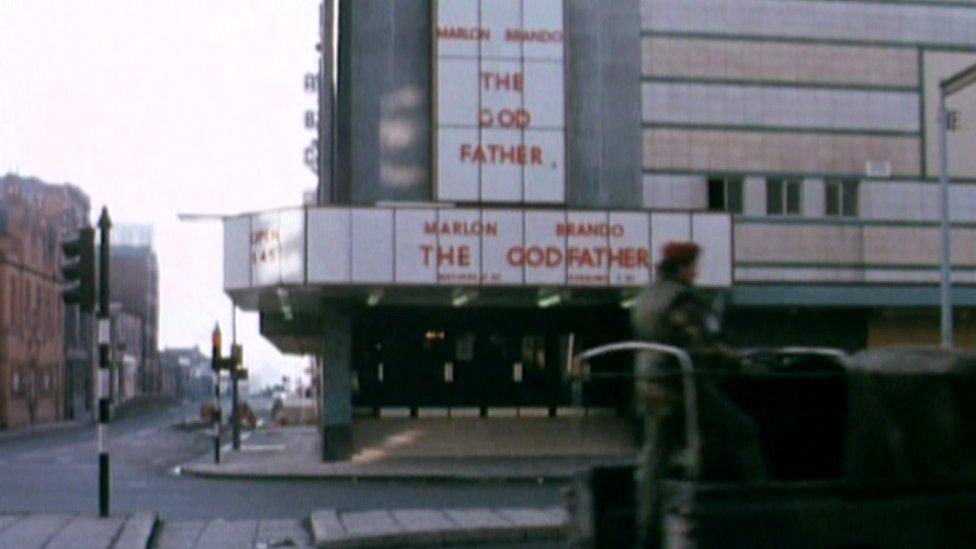
The Troubles had a negative impact on Belfast's cinemas
Picture palaces soon popped up all over the city.
"Each of the great picture palaces in Belfast, whether it be the Ritz or the Troxy or the Curzon, they all had these kind of exotic names.
"They all had unique individual characters and they all showed very different films," says Brian.
"They were showing one film each.
"Some showed comedy, some showed cowboy movies, some showed the romantic weepies.
"They also represented the area and the community that they were in.
"So the Strand very much represented this area in east Belfast, very much like the Stadium on the Shankill Road represented the people of the Shankill or on the Falls Road it was the Broadway."
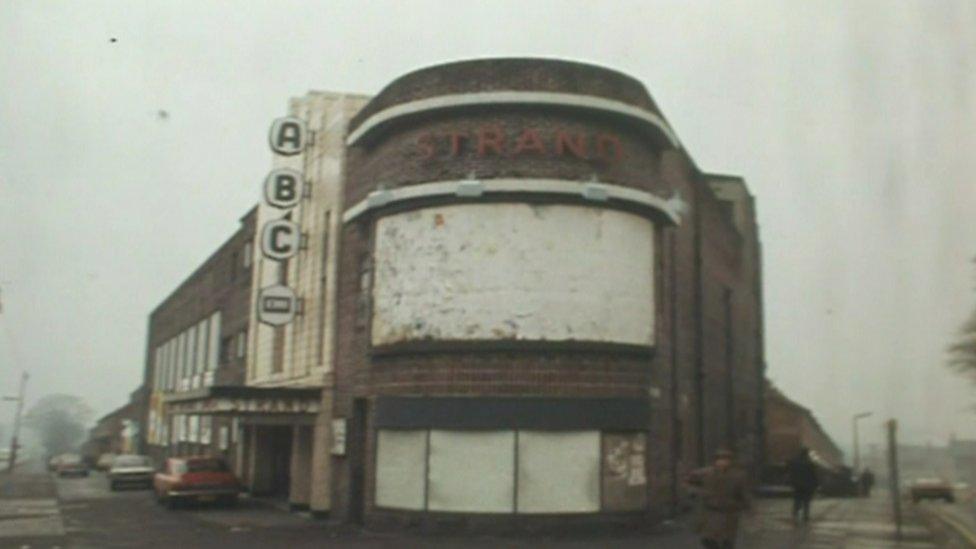
The Strand Belfast is the only one remaining from the city's golden age of cinema
But with every decade, the picture changed.
"The biggest impact on cinema going in Belfast came with the arrival of television," says Brian.
"So cinemas went from 40 plus down to 20.
"Then with the impact of the Troubles in 1969 it was no longer safe to go out at night and the city centre closed down and sadly some of the cinemas were targeted and they were firebombed and destroyed."
Now only one of the original cinemas remains - The Strand in east Belfast.
"The Strand is an ocean liner of a cinema - it is a ship of dreams, it has survived almost by default," Brian says.
The cinema has been under threat of closure, was firebombed and at one stage was going to be a supermarket.
"It was going to be all these things and yet it survived.
"That really is a testament to the spirit of this place, that people here saw something special and it must be preserved and treasured."
The chief executive of The Strand, Mimi Turtle, says it has always been the heart of the community in east Belfast.
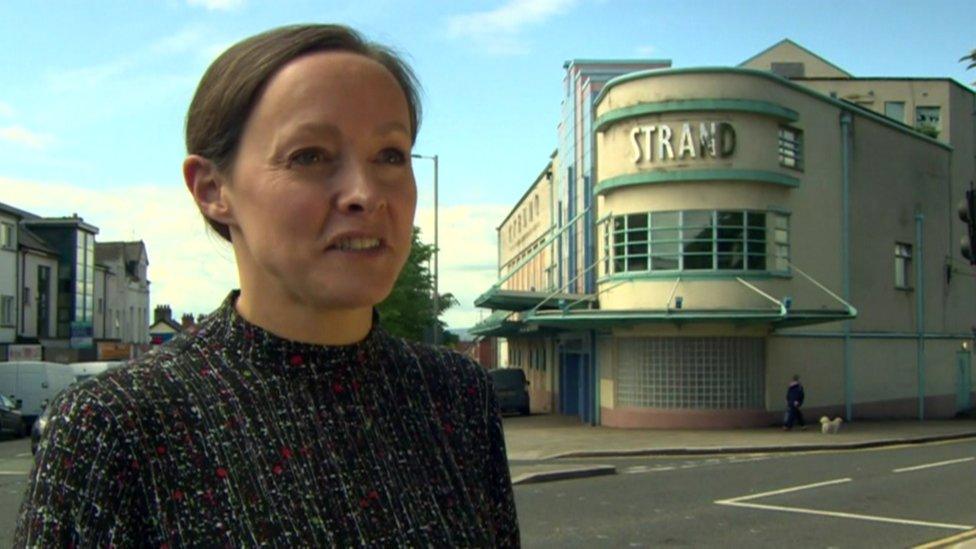
The Strand's Mimi Turtle says there has been a conscious effort by local people to champion it
"I think part of it is just good fortune, but it has certainly been a conscious effort by a number of different local people to champion it, to make sure that what it provides is relevant to the needs of the local community," she says.
But while the curtain has closed for many of the city's cinemas, their legacy lives on in Belfast City Hall because of one lord mayor's special role.
"My great grandfather Sir Crawford McCullagh was lord mayor during the 1930s and he wanted to open his own cinema," says Susie Cunningham.
He opened the Classic cinema in 1923, the first super cinema to be built in Belfast. It later became the Gaumont before changing to retail and ending up as a branch of British Home Stores.
"I think he would be disappointed to say the least that his vision has not been carried on," Susie says.
"Because he was a man of vision and taste and style and the Classic cinema epitomised style at that time and also because of the time.
"It was after the war and people wanted a release from a home life maybe that was difficult.
"There was not a lot of entertainment in Belfast at that time so going to the cinema was a very special thing.
"So I think that Belfast has lost a lot because of that."
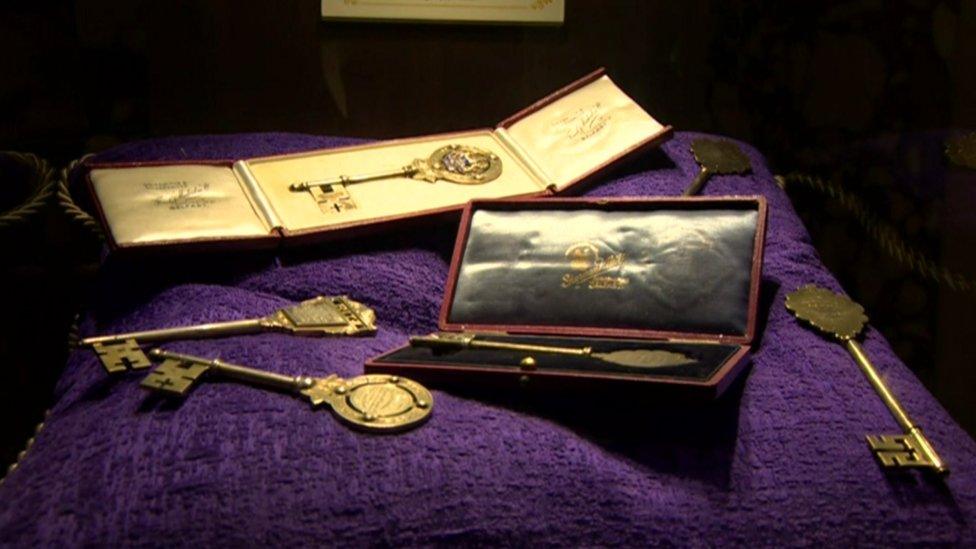
Commemorative keys from when a new cinema opened remain in Belfast
As lord mayor of Belfast during the boom cinema years of the 1930s, Sir Crawford was presented with a commemorative key each time a new cinema opened.
"It is a pity that all those lovely cinemas have all gone now, but the fact that the keys remain is something I think he would have been very happy with and very proud of," says Susie.
The keys were stored in the basement of Belfast City Hall.
A tour and collection assistant there, Christopher Burns, found them and put them on display in the main atrium.
So what is the future of cinema in the city?
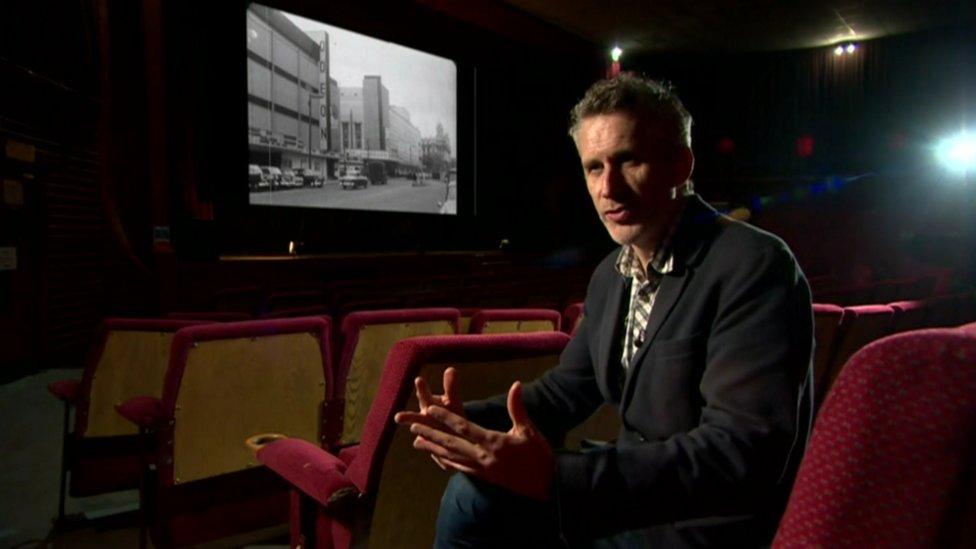
Brian Henry Martin says cinema must be preserved in Belfast city centre
Filmmaker and cinema aficionado Brian Henry Martin says it is uncertain.
"We are facing the closure of the Movie House cinema on the Dublin Road which will be the last stand-alone cinema in the city centre as opposed to cinemas in shopping centres.
"I think that cannot really happen.
"That would be the first time in a hundred years where were won't have a stand-alone cinema in the city centre.
"That does not seem right."
He adds: "I think what cinema does uniquely is bring people together.
"You sit in an audience like this and you do not know who you are sitting beside but you have the same experience.
"You laugh and cry together. We need that and we need that to be preserved."